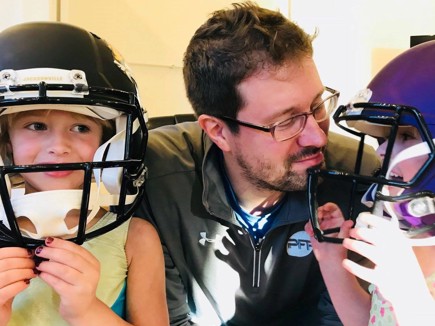Eric Eager
SummerSports
Palm Beach, Florida, U.S.
Department: Research and Development
Education: B.A. Mathematics, Minnesota State University-Moorhead, Ph.D. Applied Mathematics, University of Nebraska-Lincoln
Career stage: Mid

What do you do?
Trained as an applied mathematician, I now run a team that uses data and information to make stakeholders better decision makers in sports. I also co-host the SumerSports Show podcast where we talk about how to solve problems with traditional and analytical approaches to football.
What types of skills do you use?
Mathematics, statistics, computer programming, communication, and management.
How are applied mathematics and/or computational science important to what you do?
Having a mathematical habit of mind is essential for “jumping the line” in an established profession like sports. The ability to look at problems differently than the consensus and having the tools to produce solutions quickly are essential in a fast-paced and ever-moving environment.
What are the pros and/or cons of your profession/job?
Relative to academia, where I spent my first six years, private industry is a lot more messy—for example, in academia everyone more-or-less has the same academic background as you do, but this is not the case in industry. The rewards (better pay, access to talent) are very good.
Does your job offer flexibility?
Yes, I work completely remotely at the moment.
What career path did you take to your current position?
I studied applied mathematics and mathematical biology and wrote my Ph.D. thesis on how stochasticity and nonlinear processes affect population dynamics. I spent my first six years as a professor at the University of Wisconsin-La Crosse, before transitioning to a career in football analytics. Having flexibility as a professor allowed me to do consulting on the side and find a passion in this area. I still dabble in teaching as an instructor for Wharton and DataCamp and I maintain a strong interest in mentorship. Prior to joining Sumer, I held similar positions at Pro Football Focus (PFF), where I used my training as an applied mathematician to produce solutions to quantitative problems for National Football League and NCAA Football clients and numerous media clients and contacts. I also co-hosted the PFF Forecast Podcast, which was the most popular football analytics podcast in the world.
Was your career path well planned or a result of taking opportunities as they arose?
My transition to private industry was very much a chance occurrence. Folks who want to work in sports now have a somewhat more direct path (thanks to the hard work of a lot of people)—including degrees in things like data science, sports analytics, and related fields popping up.
What advice would you give to someone pursuing a similar degree or profession?
Be ready to work in an industry that isn’t even defined, yet. (American) football analytics was barely a field when I started my degree. When I got my Ph.D. in math in 2012, no NFL teams had a full-time data scientist on staff, and neither did the company I ended up working for first (PFF) —I was their first data scientist.
Was there anything that surprised you when you started out in your career?
Academia allowed for a lot of flexibility, so if you are transitioning out of it, be sure you’re willing to work completely on someone else’s time, until things change.
Salary
Management/partner roles in data science range from $150K–$500K in sports and can often be higher for non-sports jobs.
Stay Up-to-Date with Email Alerts
Sign up for our monthly newsletter and emails about other topics of your choosing.

